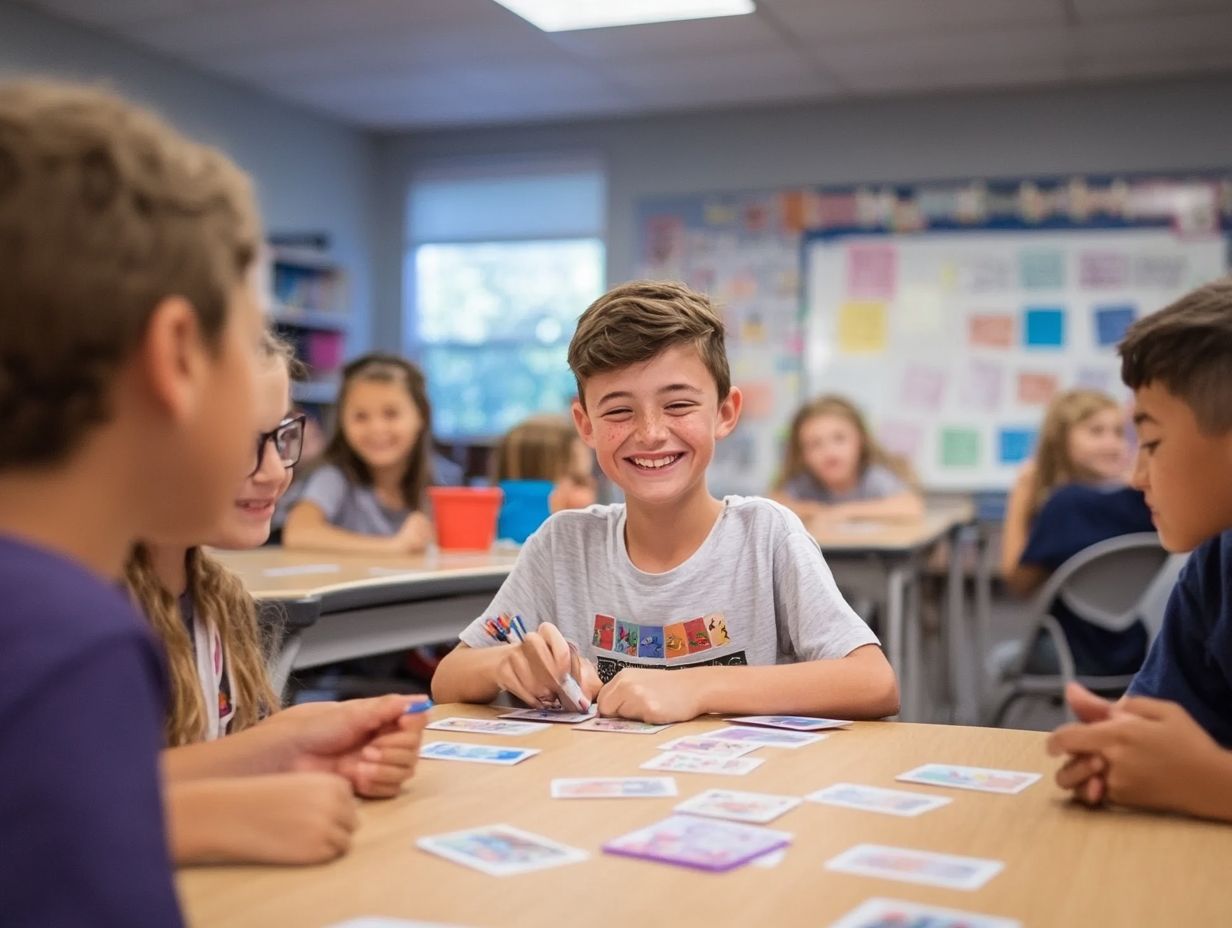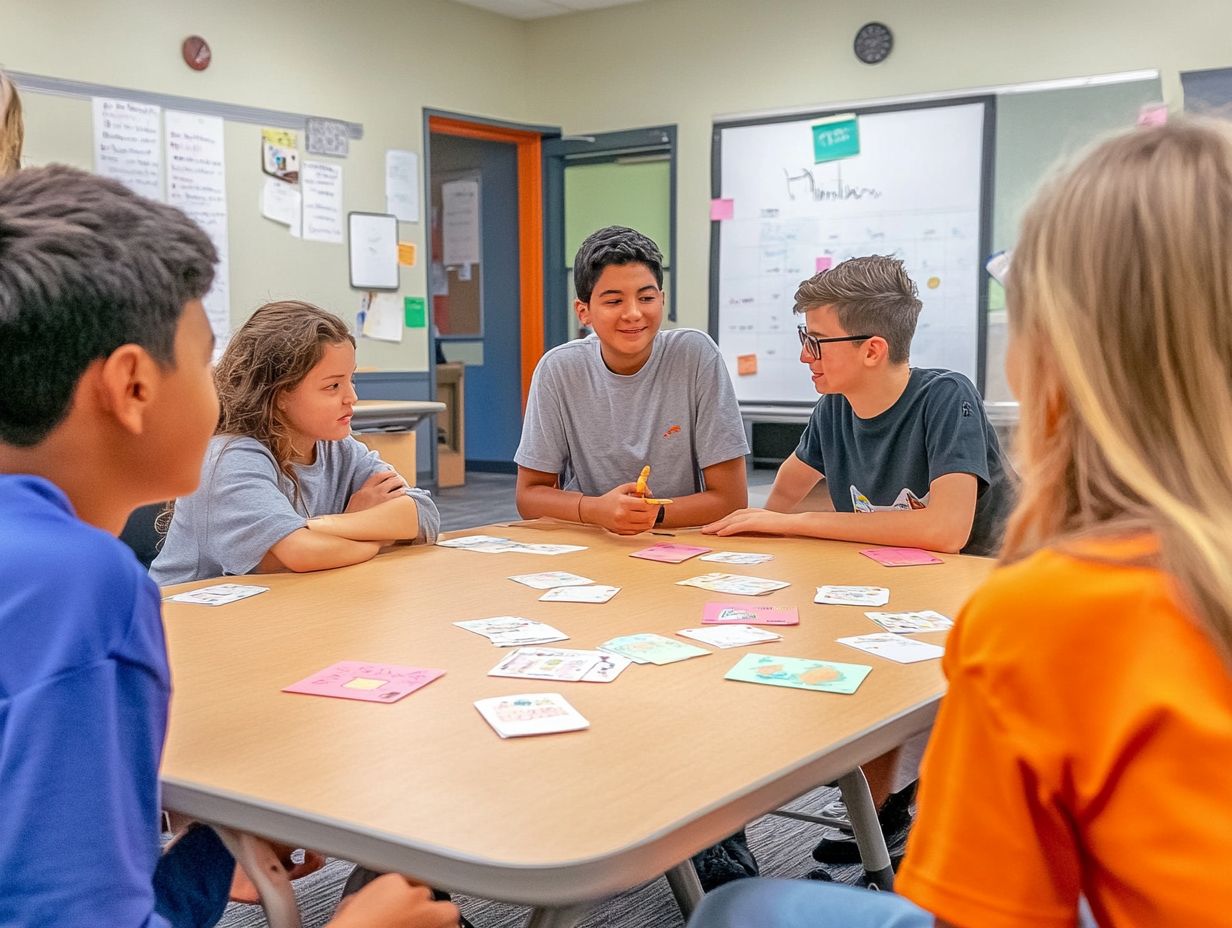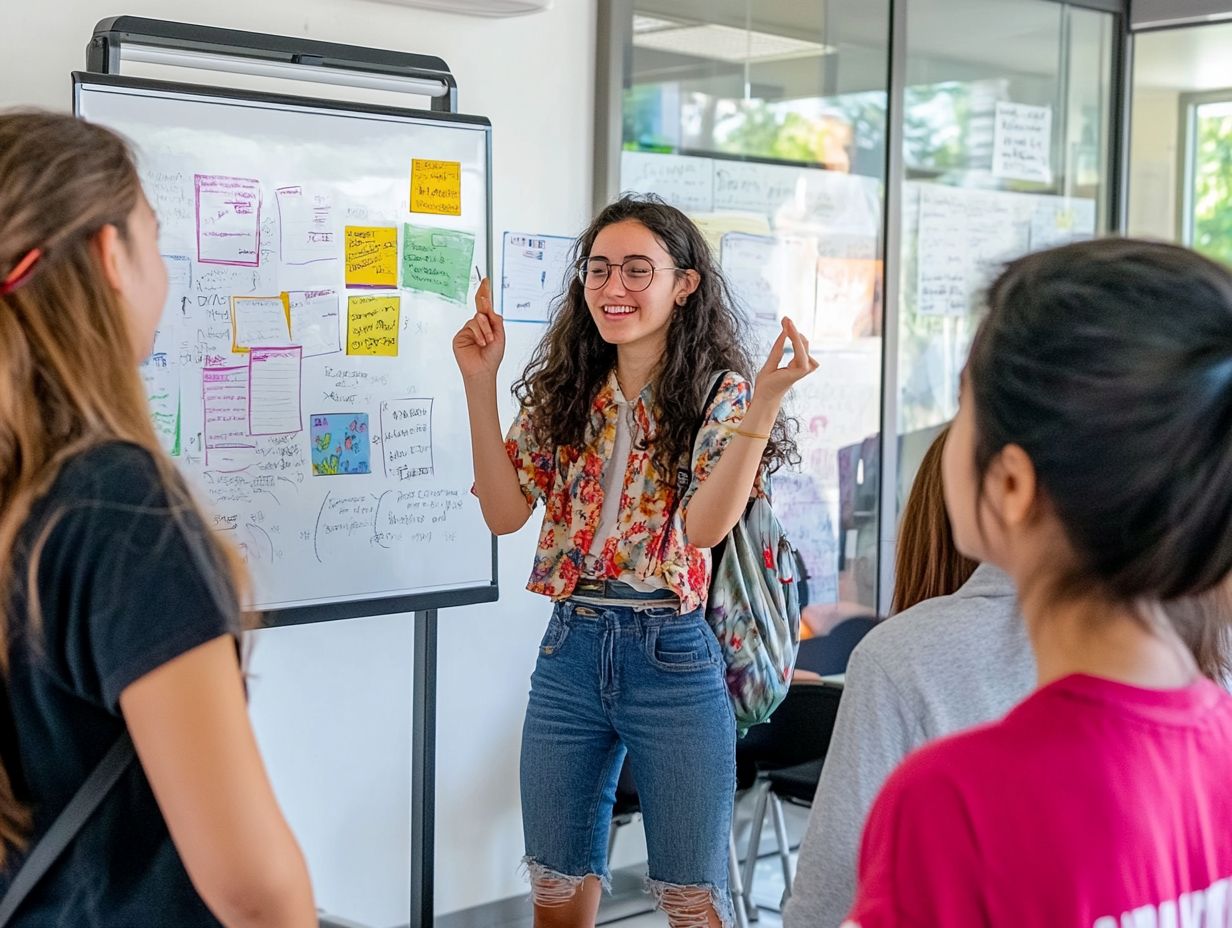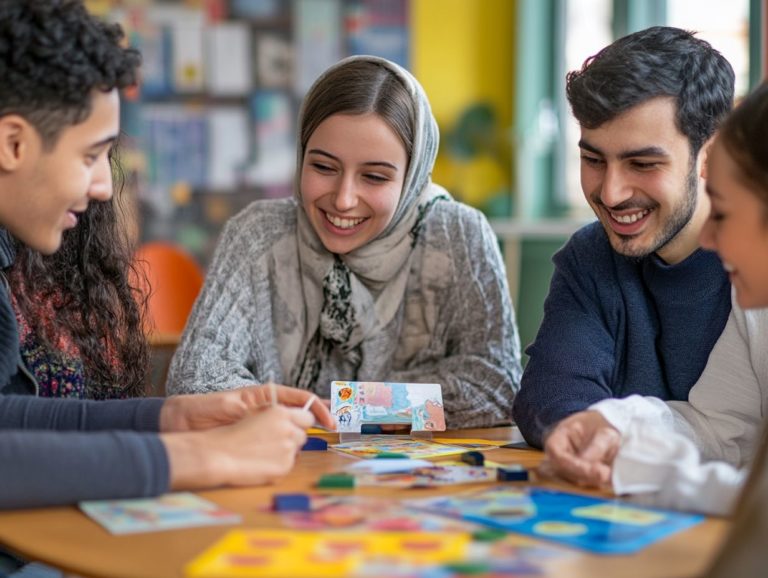5 Engaging Language Learning Activities
Learning a new language is an exhilarating journey filled with excitement and challenges. Doing fun activities can significantly enhance your experience.
You can connect with native speakers through language exchanges or immerse yourself in captivating films and games. Countless opportunities await to elevate your skills!
Let s explore five dynamic language-learning activities that make the process enjoyable and boost your fluency. You ll also get practical tips for integrating these activities into your daily routine while keeping your motivation high.
Dive in and discover how to transform language learning into an engaging adventure!
Contents
- Key Takeaways:
- 1. Language Exchange with Native Speakers
- 2. Watching Movies or TV Shows in the Target Language
- 3. Playing Language Learning Games
- 4. Reading Books or Articles in the Target Language
- 5. Participating in Language Learning Challenges
- What Are the Benefits of Engaging Language Learning Activities?
- How Can Language Learning Activities Be Incorporated into Daily Life?
- What Are Some Common Challenges with Language Learning Activities?
- How Can One Stay Motivated with Language Learning Activities?
- What Are Some Tips for Making the Most of Language Exchange with Native Speakers?
- What Are Some Examples of Language Learning Games and How Do They Help?
- Frequently Asked Questions
- What are 5 engaging language learning activities?
- How can language immersion help with learning a new language?
- What are some popular language games to incorporate in learning activities?
- How does role-playing benefit language learning?
- What are some cultural activities that can enhance language learning?
- How can virtual language exchange help with language learning?
Key Takeaways:

- Engage in language exchange with native speakers to improve speaking and listening skills.
- Watch movies or TV shows in your target language to immerse yourself in the language and culture.
- Use language learning games to make the process fun and interactive.
1. Language Exchange with Native Speakers
Language exchange with native speakers is enriching. It boosts your language learning journey and deepens cultural understanding.
You can practice vocabulary and grammar in real conversations while getting feedback from fluent speakers. For example, Rachel Perez demonstrates effective communication strategies.
Many people notice a big improvement in their speaking skills through these exchanges. For instance, Mark learned Spanish and developed a passion for Latin American culture through conversations with a native speaker.
These success stories show that cultural immersion and personal interaction can make learning more meaningful.
2. Watching Movies or TV Shows in the Target Language
Watching movies or TV shows in your target language is a captivating way to learn. You gain vocabulary and grammar in context while exploring the culture.
Shows like *Sesame Street* and *Alma s Way* introduce idiomatic expressions and cultural nuances often missed in textbooks. Animated series use humor and relatable stories to simplify complex language concepts.
Adding subtitles helps you read along, improving comprehension and pronunciation. If you prefer, dubbing immerses you in the language’s sounds.
This blend of storytelling and accessible formats makes learning effective and enjoyable.
3. Playing Language Learning Games
Language learning games like bingo, charades, or Jeopardy turn education into a fun adventure. Engaging in fun challenges for language learners can further boost your engagement and retention of language skills.
Games create a relaxed environment for practicing what you’ve learned. For instance, using charades in class generates excitement and encourages teamwork.
Online platforms like Kahoot! take it up a notch with real-time quizzes. These games build camaraderie and enhance your confidence, helping you express yourself fluently in the target language.
4. Reading Books or Articles in the Target Language

Reading books or articles in your target language is an essential practice for enhancing your language skills. It boosts your vocabulary and comprehension while immersing you in the culture and global perspectives that shape the language.
Choosing age-appropriate and level-appropriate reading materials is key to maintaining your motivation and achieving fluency. When you engage with texts that align with your understanding, you ll find enjoyment and clarity in your reading experience.
For example, if you re a younger reader, illustrated children’s books can be a fantastic choice. They often incorporate simple language and captivating stories. As a teen or adult, explore genres like young adult fiction, mystery novels, or graphic novels to keep your interest piqued.
Authors like Roald Dahl for children or John Green for teenagers craft relatable narratives. Isabel Allende’s works can enthrall older learners, blending language acquisition with cultural insights.
5. Participating in Language Learning Challenges
Participating in language learning challenges can ignite your motivation and encourage you to engage deeply with your studies. These experiences help you develop essential skills like expanding your vocabulary, applying grammar effectively, and communicating clearly through structured, dynamic activities.
You’ll encounter various challenge formats, from vocabulary quizzes that test and enhance your linguistic knowledge to speaking contests that boost your fluency and confidence. Writing prompts spark your creativity and refine your structure.
Each challenge provides a platform for you to showcase your progress and fosters an environment rich in community support. Feedback from peers and mentors inspires you to push your boundaries, reinforcing your accomplishments and setting the stage for future growth.
Ultimately, this strong support system propels you forward, turning each challenge into an opportunity for collective achievement!
What Are the Benefits of Engaging Language Learning Activities?
Engaging in a variety of language learning activities presents many benefits for you. These include honing your communication skills, enhancing vocabulary retention, and fostering enjoyment and participation. Exploring unique language learning techniques can significantly elevate your overall learning experience, no matter your level.
These activities ignite your motivation and bolster your retention of language concepts. For example, immersing yourself in role-playing scenarios helps you navigate real-life conversations, which is one of the 5 tips for effective language learning, boosting your comfort and fluency with the language.
Incorporate cultural elements like music, food tasting, or virtual tours of countries where the language is spoken. These engaging methods deepen your understanding of the culture and its context. They create a dynamic learning environment, enabling you to connect more profoundly with the material and nurturing a genuine passion for language acquisition.
How Can Language Learning Activities Be Incorporated into Daily Life?
Incorporating language learning activities into your daily life creates a seamless practice environment. This allows you to reinforce your skills through simple yet effective methods.
Label items in your home, engage in daily dialogues, or utilize digital tools for vocabulary enhancement. Use language exchange apps to connect with native speakers for real-time conversation practice.
Set aside just a few minutes each day to practice guided lessons on popular platforms like Duolingo or Babbel. This can significantly bolster your language acquisition.
Join local community groups or online forums dedicated to language practice. This fosters accountability and helps you build a supportive network of fellow learners.
By integrating small, consistent language exercises into your routines, you can transform mundane tasks into engaging linguistic opportunities. Make your journey toward fluency effective and truly enjoyable!
What Are Some Common Challenges with Language Learning Activities?

Common challenges you may face with language learning activities include a lack of motivation, insufficient feedback, and difficulty in maintaining consistency. These issues can hinder your progress and engagement in your studies.
Obstacles can arise from various factors, such as the daunting task of mastering a new language, juggling practice with other commitments, or even the fear of making mistakes in a new linguistic environment.
You can overcome these challenges by setting specific, achievable goals to maintain focus and drive. Regularly checking your own progress and seeking constructive feedback can serve as powerful motivators, providing you with a clearer picture of what you re doing well and what you need to improve.
Establishing a routine that incorporates short, varied practice sessions promotes consistency, ensuring that your learning journey remains enjoyable and sustainable.
How Can One Stay Motivated with Language Learning Activities?
Staying motivated in your language learning journey can be an exciting adventure! It involves setting achievable goals, using engaging methods, and seeking community support to share your progress and celebrate your achievements.
By tracking your progress through apps or journals, you can visualize your growth, which often ignites further enthusiasm. Joining study groups adds a social flair, turning solitary study sessions into enjoyable gatherings where you exchange tips and resources with fellow learners.
Choosing learning games that make studying fun and competitive can transform a chore into an interactive adventure, allowing you to earn rewards or compete in challenges with peers.
These strategies make the process enjoyable and sustain your motivation over the long haul, making language acquisition a truly rewarding journey.
What Are Some Tips for Making the Most of Language Exchange with Native Speakers?
To truly elevate your language exchange experience with native speakers, prepare specific topics for discussion, actively listen, and ask questions that nurture meaningful communication and cultural understanding.
This thoughtful preparation smooths the initial conversation and ensures both you and your partner are engaged and invested in the dialogue.
When selecting conversation topics, consider mutual interests; this strategy can lead to deeper discussions, making your exchange both enjoyable and informative.
Using techniques like summarizing key points or reflecting on what was said enhances your listening skills, allowing for richer dialogue.
Exchanging reciprocal feedback is essential; it provides valuable insights into areas for improvement while reinforcing your learning by highlighting shared strengths and challenges.
What Are Some Examples of Language Learning Games and How Do They Help?
Language learning games like 20 Questions, story cubes, and improvisational dialogues elevate the learning experience, transforming it into an engaging journey. For more ideas, check out fun ways to engage with language learning that sharpen critical language skills through interactive participation and collaboration.
These games challenge you to think on your feet and dive into meaningful conversations, compelling you to use vocabulary in practical contexts.
For example, in 20 Questions, you ll find yourself asking yes-or-no questions to uncover a mystery object, honing your questioning abilities and enriching your vocabulary. Story cubes take it a step further by offering visuals that ignite your imagination and guide your storytelling. Meanwhile, improvisational dialogues let you role-play, boosting your fluency and confidence in speaking.
Educators can easily incorporate these activities into their lessons, tailoring the complexity to suit your proficiency level, thus creating a dynamic and inclusive learning environment that caters to everyone s needs.
Frequently Asked Questions

What are 5 engaging language learning activities?
- Language Immersion: Surround yourself with native speakers and practice conversation.
- Language Games: Use fun games like Pictionary and Scrabble to enjoy learning.
- Role-Playing: Act out real-life situations to boost your speaking skills.
- Cultural Activities: Explore cooking, dancing, or music to connect with the culture.
- Virtual Language Exchange: Connect online with native speakers to practice.
How can language immersion help with learning a new language?
Language immersion helps you dive deep into the language. You ll pick up on subtle differences, like slang, that you won t learn in a classroom.
Being surrounded by native speakers enhances your listening, speaking, and comprehension skills.
What are some popular language games to incorporate in learning activities?
Popular language games include Pictionary, Charades, and Scrabble. These games make learning fun and help improve vocabulary and spelling.
Other games, such as Memory, Hangman, and Bingo, can also be adapted for language learning.
How does role-playing benefit language learning?
Role-playing helps improve your speaking and comprehension skills by acting out real-life situations. It builds confidence in using the language in practical scenarios.
Additionally, it aids in understanding the cultural norms associated with the language.
What are some cultural activities that can enhance language learning?
Cultural activities like cooking and dancing offer deeper insights into the language’s culture. They also allow for fun and interactive language practice.
Understanding the cultural context can enhance your comprehension and retention of new vocabulary and grammar rules.
How can virtual language exchange help with language learning?
Virtual language exchange connects you with native speakers online! It s a fantastic way to practice in a lively setting.
This experience allows you to understand different accents and gain insights into the culture and customs of the language.






